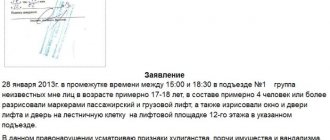Robbery is a crime against the constitutional rights and freedoms of a person, for which criminal liability and punishment are established by the court.
Punishment for this criminal act is determined in accordance with the provisions of Article 162 of the Criminal Code of the Russian Federation. Here are 4 points with an established preventive measure - without qualifying signs and with various forms of qualification.
What is robbery
Criminal law interprets this act as actions aimed at taking possession of someone else’s property, while the attackers use violence or the threat of violence to achieve their criminal goals.
The legislator gives a fairly complete definition of the composition, indicating the specific characteristics that it must have:
- this is an attack;
- the purpose of the attack is only theft;
- violence is used or threats of violence are made.
Such actions can only be intentional; criminals must be aware and desire to achieve the goal of the robbery; all their actions must be aimed at taking possession of property, money, jewelry, etc.
What are the signs of violence against a victim? The Supreme Court clarified that it must be dangerous to health at the time the crime was committed or correspond to at least slight harm to health (that is, causing health impairment for up to 21 days).
Characteristics of the act
Robbery is the most serious crime among crimes against property. It is closely related to the concept of theft of material assets.
Part 1 of Art. 162 of the Criminal Code of the Russian Federation defines robbery as an attack with the use of violence dangerous to life and health or with the threat of its use, the purpose of which is the theft of someone else’s property.
In order to evaluate a crime as robbery, the composition of this particular criminal offense must be established. It includes 4 elements:
- Subject – sane people over the age of 14 can be held accountable under the Criminal Code.
- The subjective side is the attitude of the perpetrator to the crime. Direct intent, which is aimed at taking possession of property that does not belong to the attacker. Robbery is committed solely for self-interest. The criminal is fully aware that material assets do not belong to him, he has no right to dispose of them, and takes them from the owner against his will. The attacker chooses violence or the threat of using it to seize the desired property.
- A crime encroaches on two objects at once: property rights and life, health.
- The objective side, in other words, the criminal act itself, consists of a combination of elements: attack, mandatory use of violence or threat of violence for the purpose of theft.
An assault is an aggressive, sudden, rapid action against a victim. It can be obvious or hidden, for example, a blow from behind, etc.
Violence dangerous to health is injuries that cause harm to the health of the victim, assessed according to medical criteria as mild, moderate, or severe.
Threat of violence - a statement, a demonstration of the intention to use it. For example, “I’ll kill”, “I’ll cut off my head.” It must be real, based on the situation in which it was expressed and the possibility of its implementation by the perpetrator. In other words, the victim must have reason to fear her. It can be expressed in words, gestures, demonstration of dangerous objects, etc.
There may also be an unspecified, that is, vague threat, from which it is not immediately clear what the attacker means. For example, “Give it back, otherwise you’ll regret it,” “I’ll decorate it,” “I’ll cripple it.” The question of the nature of such a threat for assessment under Art. 162 of the Criminal Code of the Russian Federation is permitted, taking into account the totality of the established circumstances of the crime. For example, the number of attackers, the presence of objects used for the threat, the attitude of the victim himself towards it, etc. are taken into account.
The robbery is considered completed from the beginning of the criminal attack; its result does not affect qualifications. Regardless of the stage of completion, the act does not qualify as attempted robbery. That is, it is already over from the beginning of the attack. The likelihood of assessing actions as attempted robbery is a controversial topic in legal science; in practice, such qualifications are practically never encountered.
The result of the crime is important only for the imputation of certain qualifying criteria, for example, a large amount of damage, serious harm to the health of the victim.
Additional signs
Turning to judicial practice, we will see that a crime of this kind without additional signs is committed quite rarely. It is important to understand that this is a very dangerous crime that requires careful preparation, searching for accomplices, weapons or other items, and sometimes tracking and monitoring the victim. In such cases, the crime will correspond to parts two or three of Article 162 of the Criminal Code of the Russian Federation:
using weapons or other objects
Robbery with a weapon is quite common in situations where the victim needs to be intimidated or the attack is committed on a protected facility - a store, office, warehouse, etc.
Options for using weapons can be different:
- its demonstration;
- the attacker can put a knife to parts of the body (neck, head, chest, etc.);
- weapons can be used as a threat not only to the person being attacked, but also to his loved ones (children, spouse, etc.);
- its use in relation to the victim's pets.
Weapons can be either firearms or any other. Actions are qualified on the same basis if any objects were used, if they were intended to cause bodily harm: bats, stones, sticks, metal structures, etc.).
by a group of persons by prior conspiracy
Two thirds of all robberies are committed by a group of people. In this case, there is always a distribution of roles. For example, one of the attackers monitors the environment to prevent danger in the form of law enforcement, vigilant neighbors, etc. The second participant directly makes threats, backing them up with a demonstration of weapons, and demands property. Sometimes it happens that the group also includes such a person as a gunner - a person who “picks up” the victim.
Thus, in practice, there are cases where a woman in a group did nothing but call the owners of advertisements on AVITO, where cars or apartments were offered for purchase. Having heard that the object had already been sold, it was not difficult for the criminals to find out where the lucky owner of a large sum of money lived and organize an attack. During the investigation of robberies and robberies, it is very difficult to bring such “guiders” to justice; they often find themselves on the sidelines and are not punished;
with penetration into a home or premises
Here it is important to establish precisely the illegality, that is, the absence of any permission to enter a particular property. Home invasion often occurs in cases where the victim himself opens the door to a stranger; sometimes attackers use neighbors, forcing them to ring the doorbell under threat of beating. In small towns, it has become a habit for many not to lock the door - such carelessness can be costly.
causing grievous bodily harm
During an attack, significant harm to the health of the victim may be caused; for such consequences, Part 4 of Art. 162 of the Criminal Code of the Russian Federation.
Definition of the concept
Legislative acts say that the theft of someone else's property using violent acts is called robbery. That is, the offender, in order to take possession of any valuables in the possession of another person, commits physical violence or makes threats about it.
Among the main features of this crime, two aspects should be highlighted: the property nature (the person committing the crime seizes other people’s material assets), and a wide range of aggressive manifestations (both overt and hidden types).
Accordingly, the objective side of the crime consists of two components:
- property in the possession of the injured person;
- health and life of the person who was attacked.
Any person who has reached the age of 14 can act as a subject of robbery. Accordingly, he is entitled to suffer the punishment provided for by the legislation of the Russian Federation in full.
How to behave if you are attacked and where to go
The main task of the victim of an attack is not to save his money, but to survive and preserve his health. If you work at night, it will be useful to familiarize yourself with the recommendations in case you are attacked by a robbery:
- do not argue with the attackers;
- speak calmly (no matter how difficult it may seem to do, your life is in the balance);
- if it is possible to call the police or security (for example, an emergency button in shops, stalls, etc.), call immediately;
- give up the property that the attackers demand;
- try at all costs to remember the criminals: pay attention to height, body constitution, voice, manners, distinctive features (scars, tattoos, hair color), try to remember the conversation between them, phrases, names;
- immediately after the attack, contact the police immediately (even if threats were made against you), providing all the information that you remember.
It is necessary to write a statement and send it to the police department in whose territory the crime was committed.
To the head of the police department_____ ______(which) district of the city ________ Andreeva A.A., residing at ____________ (specify) Tel._______________ (specify)
STATEMENT
I ask that persons unknown to me who attacked me in the Solnyshko store, located at the address: Moscow, _____ street, building ___, be brought to criminal responsibility. I work in this store as a night shift salesperson. On January 1, 2016, three masked individuals burst into the store, two of whom were carrying knives. One of them began to demand revenue. I, fearing that the threats against me would be carried out, gave him 27,000 rubles. After that, they took the products from the shelves, put them in bags and left, threatening physical harm if they contacted the police.
I remember the attackers, I can describe their general external signs. In addition, one of them had a gold signet on his index finger.
Appendix: audit report of the “Solnyshko” store as of 01/02/2016.
Andreeva A.A., date, signature.
Gravity of the crime
Robbery can be a serious or especially serious crime, depending on the circumstances of its commission.
A serious crime is:
- robbery without qualifying characteristics;
- robbery committed by a group of persons by prior conspiracy;
- robbery committed with the use of weapons (or the threat of their use).
Particularly serious crimes include qualified types of robbery, provided for in Parts 3 and 4 of Article 162 of the Criminal Code of the Russian Federation:
- with illegal entry into a home, premises or storage;
- committed in relation to property the value of which exceeds 250 thousand rubles (large size) or one million rubles (especially large size);
- committed by an organized group, that is, a stable group of persons who have united in advance to commit one or more crimes.
Punishment
For a crime of this kind, the legislator always provides for long-term imprisonment. The article on robbery contains the following punishment terms:
- for a crime without additional signs (as we have already noted, such situations do not happen often) - up to 8 years in prison, an additional fine of up to half a million rubles may be imposed;
- if the attack was committed by several accused and/or a weapon was used, then there may be a punishment of up to 10 years in prison with an additional fine of up to a million rubles, as well as restriction of freedom;
- when there was penetration into a residential premises or a store, or in case of theft of more than 250,000 rubles - up to 12 years of isolation with the same additional punishment;
- If more than a million rubles are stolen or grievous harm is caused to the victim, then the person guilty of committing a robbery can be sentenced to up to 15 years .
Some features
- Violence or the threat of its use is a mandatory sign of robbery. Additional harm caused to the victim's health is not classified. That is, if as a result of a crime the victim, for example, received minor harm, the act is qualified as one crime under Art. 162 without additional qualification under Art. 115 of the Criminal Code of the Russian Federation, which establishes liability for causing such harm.
- According to part 1 of Art. 162 of the Criminal Code of the Russian Federation deals with robbery that did not cause harm, but is really dangerous to the life and health of the victim during the commission. For example, when suffocating techniques were used and the head was lowered into the water, the victim could have received dangerous harm to his health, but due to a coincidence of circumstances, this did not occur.
- In part 1 of the analyzed norm, violence is defined only as dangerous to life and health. Causing grievous harm is a qualifying feature under paragraph “c” of the fourth part of the article. Therefore, in Part 1 we mean violence that caused or could cause light or moderate harm.
- If the victim receives grievous harm that causes his death, the criminals will be charged with a set of crimes under paragraph “c” of Part 4 of Art. 162 and part 4 of Art. 111 of the Criminal Code of the Russian Federation.
- Robbery will be an act during which, in order to take possession of material values, to suppress resistance, a person is injected with a substance that poses a danger to health and life.
- It will not be robbery to take property not for personal gain, but, for example, for the purpose of using it and then returning it, or when the perpetrator believes that he has the right to this property.
- If, during the theft, the actions of the criminal cease to be secret to others, but, despite this, he continues the theft and at the same time begins to use violence that is dangerous to health, or threaten them, these actions are classified as robbery.
Criminal liability provided for committing
In order to better understand the terms of punishment provided for committing robbery (Article 162 of the Criminal Code of the Russian Federation), consider the table.
At the top horizontally is the type of crime (simple robbery comes first, and then with qualifying characteristics). On the vertical left is the type of punishment.
A dash means that such punishment is absent or not imposed.
| Robbery | Robbery committed by a group of persons by prior conspiracy | Robbery committed with the use of weapons or objects used as weapons | Robbery committed with illegal entry into a home, premises or other storage | Robbery committed on a large scale ( | Robbery committed by an organized group | Robbery committed on an especially large scale | Robbery committed with infliction of grievous harm to the victim's health | |
| Forced labor (alternative sanction) | up to 5 years | — | — | — | — | — | — | — |
| Deprivation of liberty | up to 8 years | up to 10 years | up to 10 years | from 7 to 12 years | from 7 to 12 years | from 8 to 15 years | from 8 to 15 years | from 8 to 15 years |
| The court may or may not impose a fine along with imprisonment) | up to 500,000 rubles or in the amount of wages (other income of the convicted person) for a period of up to three years | up to 1 million rubles or in the amount of wages (other income of the convicted person) for a period of up to five years | up to 1 million rubles or in the amount of wages (other income of the convicted person) for a period of up to five years | up to 1 million rubles or in the amount of wages (other income of the convicted person) for a period of up to five years | up to 1 million rubles or in the amount of wages (other income of the convicted person) for a period of up to five years | up to 1 million rubles or in the amount of wages (other income of the convicted person) for a period of up to five years | up to 1 million rubles or in the amount of wages (other income of the convicted person) for a period of up to five years | up to 1 million rubles or in the amount of wages (other income of the convicted person) for a period of up to five years |
| Restriction of freedom (the court may or may not appoint it together with imprisonment) | — | up to 2 years | up to 2 years | up to 2 years | up to 2 years | up to 2 years | up to 2 years | up to 2 years |
Judicial practice: how many years do they give and what punishments are most often prescribed under this article?
- If we are talking about so-called qualified robberies, that is, those crimes that are prohibited by parts 2,3 or 4 of Article 162 of the Criminal Code of the Russian Federation, then in the vast majority of cases the courts impose a sentence of imprisonment.
The choice by the court of the regime of the colony in which the convicted person will serve his sentence depends on the specific circumstances of each case.
Example of court decision 1:
The Pervomaisky District Court of Omsk, in case No. 1-359/2019, sentenced the previously convicted Sulayev to 8 years in prison for robbery committed with infliction of grievous harm to the victim’s health (Part 4 of Article 162 of the Criminal Code of the Russian Federation).
The court took into account the presence of an unserved sentence for a previous crime and, based on the totality of sentences, imposed a sentence of 8 years and 1 month of imprisonment in a high-security correctional colony.
Example 2:
On April 25, 2016, V.I. Bazarkin was convicted by the Staroshaigovsky District Court of the Republic of Mordovia under Part 2 of Article 162 of the Criminal Code of the Russian Federation. The court imposed a sentence of imprisonment for a period of 3 years to be served in a general regime correctional colony.
By the decision of the Leninsky District Court of Saransk, Republic of Mordovia, dated November 13, 2021, he was released on parole for 1 year 02 months 15 days.
- If we are talking about “simple”, that is, unqualified robbery, a crime, the responsibility for the commission of which is provided for in Part 1 of Article 162 of the Criminal Code of the Russian Federation, then the courts predominantly sentence the person to serve a sentence of imprisonment in general regime colonies.
Example of court decision 1:
Khudoiberdiev Dovron Tolibzhonovich, the court sentenced 06/08/2011 to imprisonment for a period of 4 years to be served in a general regime correctional colony for committing robbery - part 1 of article 162 of the Criminal Code of the Russian Federation.
Example 2:
The Pravoberezhny District Court of the city of Lipetsk entered verdict No. 1-247/2019 dated August 27, 2021, sentenced Buev Roman Alekseevich to 2 years in prison for committing robbery.
The court partially added this punishment to the unserved sentence for 2021. The final term of imprisonment was 2 years 6 with the sentence being served in a general regime correctional colony.
Assignment of punishment for relapse
Reference. Recidivism is recognized only as the commission of an intentional crime by a person who already has a criminal record for a previously committed intentional crime (Article 18 of the Criminal Code of the Russian Federation).
In case of recidivism, the term of punishment cannot be less than a third of the maximum term of the most severe type of punishment. This means that in case of repeated unskilled robbery, the minimum term of imprisonment will be 2 years 6 months.
However, if the court determines the presence of mitigating circumstances, then the sentence may be imposed lower than that calculated by the rule in question.
Mitigating circumstances include, for example, pregnancy, the presence of young children, if the crime was committed due to difficult life circumstances.
A complete but non-exhaustive list of mitigating circumstances is presented in Article 61 of the Criminal Code of the Russian Federation.
For robbery, the terms for expunging a criminal record are as follows:
- 8 years after serving the sentence for:
- ordinary robbery;
- robbery committed by a group of persons by prior conspiracy or with the use of weapons or objects used as weapons.
- 10 years after completion of sentence: for all other qualified robbers.
Is a suspended sentence possible?
In accordance with the rule of Part 1 of Article 73 of the Criminal Code of the Russian Federation, a suspended sentence can only be assigned for robbery without qualified characteristics. However, even in this case, the courts practically do not assign a suspended sentence.
You can read about liability for robbery committed in complicity here.
Difference from similar acts
The difference between robbery and related offenses related to theft lies in the way it occurred.
In case of theft, the theft is committed secretly for the victim himself and persons who could become witnesses to it.
In robbery, the theft occurs openly. Violence and the threat of violence during this act is a sign that aggravates the responsibility of the perpetrator. As a result, no harm should be caused to the victim’s health or life. Such violence includes injuries regarded as beatings.
For robbery, violence or threat are an integral feature. In order to qualify the actions of the perpetrator under Art. 162 of the Criminal Code of the Russian Federation, it is necessary that the violence used or that which the attacker threatened to use were dangerous to the health and life of the victim, that is, they caused or could cause light, moderate or serious harm.
Don't confuse robbery and extortion. The latter is also characterized by violence and threat. The difference is that in robbery the perpetrator attacks the victim in order to immediately take possession of his property. The seizure occurs immediately and against the will of the victim. And extortion is only a demand to transfer property to the perpetrator, when the victim, under pressure from demands, violence, and threats, is forced to transfer the property himself.









